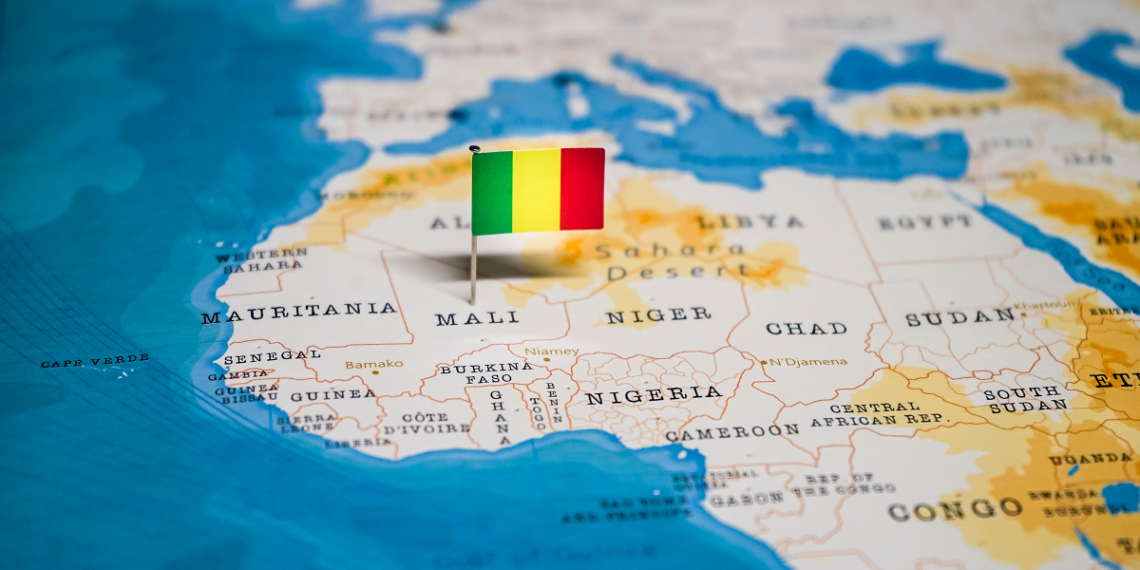Miners in the gold-rich West African nation of Mali have welcomed news that leaders from the Economic Community of West African States (ECOWAS) agreed overnight to lift economic and financial sanctions imposed on the nation, Reuters reports.
The sanctions were released in January in opposition to military rule decisions and were taken by ECOWAS as a move to defend democracy and stability in Mali.
The sanctions badly hit the country, with the country’s economy already under severe strain from a decade-long jihadist insurgency.
Mali, which underwent coups in August 2020 and May 2021, has defaulted on over US$300M of its debt due to the sanctions.
The sanctions also cut the conflict-ravaged nation off from the regional financial market and the regional central bank.
ECOWAS commission president, Jean Claude Kassi Brou, told reporters on Sunday 3 July that the sanctions will be lifted immediately, with Mali’s borders set to reopen and regional diplomats able to return to the nation’s capital, Bamako.
“However, the heads of state decided to maintain individual sanctions, and the suspension of Mali from ECOWAS, until the return to constitutional rule,” Kassi Brou said.
The individual sanctions targeted members of the ruling military government and the transitional council.
Firefinch hit
ASX-listed Firefinch Ltd (ASX: FFX) told its shareholders that operations at its high-grade Morila super pit gold operation in Mali had been severely impacted by the ECOWAS sanctions.
Firefinch revealed that it was expecting a significant drop in production for the June quarter to an estimated 13,300 ounces, well below previous guidance estimates of between 17,000 to 20,000 ounces of gold.
“The underperformance relative to guidance has been largely due to poor equipment availability which has been exacerbated by the delayed delivery of additional mining equipment,” the company told shareholders.
“This delay is a result of the ECOWAS sanctions imposed on the State of Mali restricting the movement of goods. Consequently, production ramp up is behind schedule.”
At the request of the government of Mali, Firefinch, in tandem with other local miners, had suspended the offset of royalties and certain taxes against its value-added tax credit claims to assist the government with meeting the challenges of the ECOWAS sanctions.
However, the mining sector in the strife-torn nation is now hoping the lifting of the sanctions will immediately ease pressure on their activities.
Mali mining
Prior to the imposition of the sanctions, state revenue from gold mining companies in Mali rose 23% year-on-year in 2021 to US$931M.
Mali is one of Africa’s top gold producers and home to industrial mines operated by companies including Barrick Gold (TSX: ABX), B2GOLD (TSX: BTO), Resolute Mining (ASX: RSG), AngloGold Ashanti (JSE: ANG), and Hummingbird Resources (AIM: HUM).
Mining, mostly for gold, is a pillar of the country’s economy, accounting for nearly 10% of gross domestic product in recent years.
Mali’s industrial gold output was 63.4 tonnes in 2021, a 2.6% drop from the previous year.
Barrick Gold is the country’s biggest producer with output reaching 23.4 tonnes last year, followed by B2GOLD with 19.6 tonnes and Resolute Mining with 5.8 tonnes.
With an estimated six tonnes produced in artisanal mines, Mali’s total gold production in 2021 was 69.4 tonnes.
Prior to the implementation of the ECOWAS sanctions, Mali’s industrial gold mines were expected to produce 64.1 tonnes of gold in 2022. New estimates have yet to be released.
January sanctions received global support
The U.S. government in particular commended the strong actions taken by ECOWAS following its Extraordinary Summit on 9 January 2022.
“We share ECOWAS’s deep disappointment with the transition government of Mali’s lack of action or progress toward organizing elections, as it committed to do following the August 2020 coup d’état,” US State Department spokesperson, Ned Price, stated.
“We support ECOWAS’s decision to impose additional economic and financial sanctions to urge the transition government to keep its pledge to the Malian people to return their country to democracy.
“We also echo ECOWAS’s concern over the likely destabilizing impact of Russia-backed Wagner group forces in Mali. As noted in the Department’s statement of December 15, 2021, these forces will not bring peace to Mali and will divert resources away from the Malian Armed Forces’ fight against terrorism.”
ECOWAS background
The ECOWAS was established in May 1975 via the treaty of Lagos. It is a 15-member regional group with a mandate of promoting economic integration in all fields of activity of the constituting countries.
Member countries making up ECOWAS are Benin, Burkina Faso, Cape Verde, Cote d’ Ivoire, the Gambia, Ghana, Guinea, Guinea Bissau, Liberia, Mali, Niger, Nigeria, Sierra Leone, Senegal, and Togo.
Considered one of the pillars of the African Economic Community, ECOWAS was set up to foster the ideal of collective self-sufficiency for its member states. As a trading union, it is also meant to create a single, large trading bloc through economic cooperation.
Integrated economic activities as envisaged in the area revolve around but are not limited to industry, transport, telecommunications, energy, agriculture, natural resources, commerce, monetary and financial issues, and social as well as cultural matters.
According to the organization, “Expectations of economic integration have always been high and a lot has been accomplished by the regional group since the endorsement of the treaty which gave it the required legal teeth. Going by current assessments, the regional body has exceeded the expectations of its founding fathers.
“Today, the organization is being acknowledged globally as a successful regional body, a toast to a workable integration and regional co-existence.”












